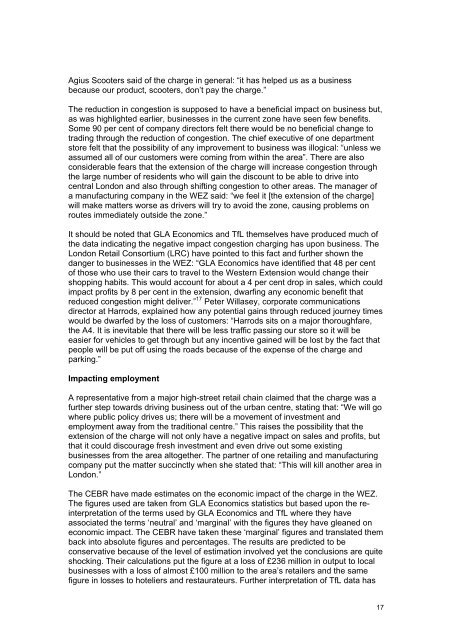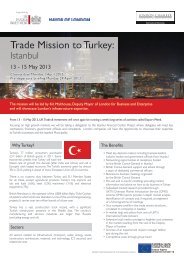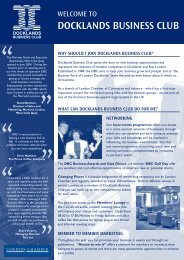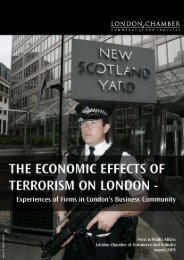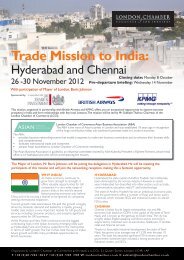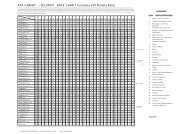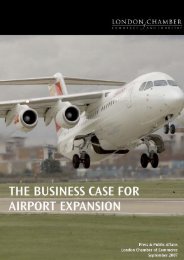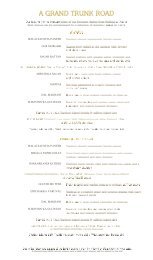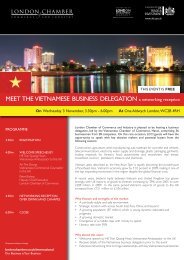GOING WEST â - London Chamber of Commerce and Industry
GOING WEST â - London Chamber of Commerce and Industry
GOING WEST â - London Chamber of Commerce and Industry
Create successful ePaper yourself
Turn your PDF publications into a flip-book with our unique Google optimized e-Paper software.
Agius Scooters said <strong>of</strong> the charge in general: “it has helped us as a businessbecause our product, scooters, don’t pay the charge.”The reduction in congestion is supposed to have a beneficial impact on business but,as was highlighted earlier, businesses in the current zone have seen few benefits.Some 90 per cent <strong>of</strong> company directors felt there would be no beneficial change totrading through the reduction <strong>of</strong> congestion. The chief executive <strong>of</strong> one departmentstore felt that the possibility <strong>of</strong> any improvement to business was illogical: “unless weassumed all <strong>of</strong> our customers were coming from within the area”. There are alsoconsiderable fears that the extension <strong>of</strong> the charge will increase congestion throughthe large number <strong>of</strong> residents who will gain the discount to be able to drive intocentral <strong>London</strong> <strong>and</strong> also through shifting congestion to other areas. The manager <strong>of</strong>a manufacturing company in the WEZ said: “we feel it [the extension <strong>of</strong> the charge]will make matters worse as drivers will try to avoid the zone, causing problems onroutes immediately outside the zone.”It should be noted that GLA Economics <strong>and</strong> TfL themselves have produced much <strong>of</strong>the data indicating the negative impact congestion charging has upon business. The<strong>London</strong> Retail Consortium (LRC) have pointed to this fact <strong>and</strong> further shown thedanger to businesses in the WEZ: “GLA Economics have identified that 48 per cent<strong>of</strong> those who use their cars to travel to the Western Extension would change theirshopping habits. This would account for about a 4 per cent drop in sales, which couldimpact pr<strong>of</strong>its by 8 per cent in the extension, dwarfing any economic benefit thatreduced congestion might deliver.” 17 Peter Willasey, corporate communicationsdirector at Harrods, explained how any potential gains through reduced journey timeswould be dwarfed by the loss <strong>of</strong> customers: “Harrods sits on a major thoroughfare,the A4. It is inevitable that there will be less traffic passing our store so it will beeasier for vehicles to get through but any incentive gained will be lost by the fact thatpeople will be put <strong>of</strong>f using the roads because <strong>of</strong> the expense <strong>of</strong> the charge <strong>and</strong>parking.”Impacting employmentA representative from a major high-street retail chain claimed that the charge was afurther step towards driving business out <strong>of</strong> the urban centre, stating that: “We will gowhere public policy drives us; there will be a movement <strong>of</strong> investment <strong>and</strong>employment away from the traditional centre.” This raises the possibility that theextension <strong>of</strong> the charge will not only have a negative impact on sales <strong>and</strong> pr<strong>of</strong>its, butthat it could discourage fresh investment <strong>and</strong> even drive out some existingbusinesses from the area altogether. The partner <strong>of</strong> one retailing <strong>and</strong> manufacturingcompany put the matter succinctly when she stated that: “This will kill another area in<strong>London</strong>.”The CEBR have made estimates on the economic impact <strong>of</strong> the charge in the WEZ.The figures used are taken from GLA Economics statistics but based upon the reinterpretation<strong>of</strong> the terms used by GLA Economics <strong>and</strong> TfL where they haveassociated the terms ‘neutral’ <strong>and</strong> ‘marginal’ with the figures they have gleaned oneconomic impact. The CEBR have taken these ‘marginal’ figures <strong>and</strong> translated themback into absolute figures <strong>and</strong> percentages. The results are predicted to beconservative because <strong>of</strong> the level <strong>of</strong> estimation involved yet the conclusions are quiteshocking. Their calculations put the figure at a loss <strong>of</strong> £236 million in output to localbusinesses with a loss <strong>of</strong> almost £100 million to the area’s retailers <strong>and</strong> the samefigure in losses to hoteliers <strong>and</strong> restaurateurs. Further interpretation <strong>of</strong> TfL data has17


